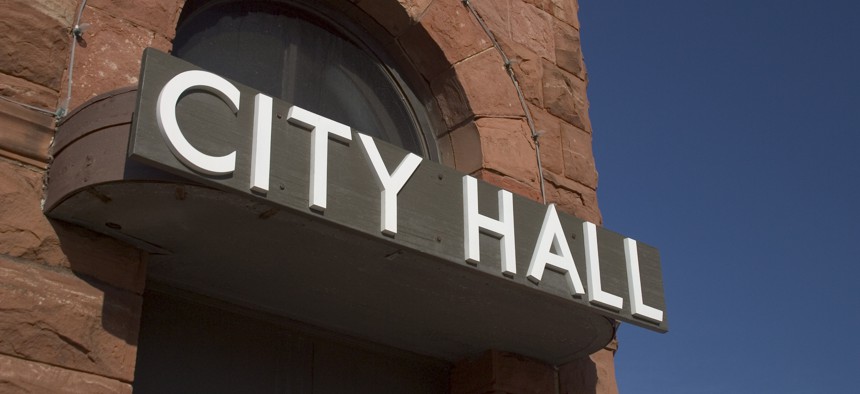‘I No Longer Feel Safe’: A Mayor Resigns, Citing Threats

tillsonburg via Getty Images
The mayor of The Village, Oklahoma, said he’d been followed home after meetings, had his tires slashed and faced other abuse. The episode mirrors a disturbing national trend.
The first openly gay mayor of a small city in Oklahoma stepped down earlier this week, citing “threats and attacks bordering on violence.” The episode comes as local officials around the country increasingly confront harassment and other menacing behavior on the job.
Adam Graham served in city government since 2019 in The Village, Oklahoma, first as a council member and then as mayor since May. In a resignation letter posted on Twitter Monday, he described how during the past month his tires were slashed, he had been followed home after city meetings, and he had been harassed or threatened while walking his dog or at Starbucks. He told the city manager he would step down “effective immediately.”
“Unfortunately, these malicious, bad-faith attacks are escalating and I no longer feel safe to serve in my capacity as Mayor,” he wrote.
Graham was not available for comment, but he indicated in his letter that the harassment stemmed from an incident that happened two months ago involving The Village residents and police from Nichols Hill, a neighboring city. The Village is located about 10 miles north of Oklahoma City and is home to just under 10,000 residents,
Rebekah Herrick, a political science professor at Oklahoma State University who has researched harassment of local officials since 2016, said in an interview that she has seen the kind of surge in threats that Graham described.
“It seems not uncommon that a mayor is going along fine, and then an issue pops up, and then all of a sudden there's lots of abuse,” she said.
Herrick pointed to the 2020 case of Joyce Warshaw, who was mayor of Dodge City, Kansas. After the city adopted a mask mandate, Warshaw resigned as the ensuing threats and harassment made her feel unsafe.
But in other places, Herrick said, the abuse can be constant. It depends on the nature of the community, she added.
Herrick pointed to a survey she worked on in the fall of last year asking mayors if they’d noticed an increase in abuse in the past five years. “Most had,” she said.
The findings showed that about 94% of respondents experienced what the study characterized as "psychological violence" at least once, nearly 25% experienced at least one threat, and nearly 16% suffered physical violence.
Herrick and her colleagues have surveyed mayors and candidates across the country, and have found that, in general, women and people of color—and especially women of color—are more likely to experience abuse, as are younger mayors, mayors of large cities and “strong mayors” who have veto or appointment powers.
In March, Mayor Lauren McLean of Boise, Idaho, issued a statement describing the threats and harassment she and other city officials there have endured during the last two years—from being targeted online to watching torch-wielding constituents gather outside her home. She said she’d given up trail running and had been assigned a security detail due to safety concerns. McLean opted to stay in office.
The Covid-19 Effect
Mayors have indicated that they believe the harassment and threats have become more common since the onset of Covid-19, Herrick said. She said she’s found preliminary evidence through her research suggesting that the pandemic has fueled violence against local politicians, though that research still needs to be peer reviewed.
As for the effects of that abuse, Herrick said that a significant share of elected officials who had been threatened, harassed or attacked also indicated they have experienced at least one symptom of post-traumatic stress disorder.
A report last year from the National League of Cities found that 87% of surveyed local officials had observed an increase in attacks on public officials in recent years. The report blamed political polarization, social media and the spread of misinformation for the increase.
"Most public officials would say: 'I didn't sign up for this,'" Clarence Anthony, executive director and CEO of the National League of Cities said during a Route Fifty event last month focused on threats and intimidation directed towards local government leaders.
"I recognize that local government is a full contact sport, but it doesn't have to be one that is uncivil and disrespectful and that's where we are today," he added.
Threats and harassment can dissuade people from seeking elected positions, according to Herrick’s findings. In one survey, she and her colleagues asked elected officials if they knew anyone who had decided not to run for office because of the hostility public officials face. Seventy-one percent of respondents said “yes.”
“That's probably where, at this point, the greatest effect is: That you have a lot of people not seeking office, more so than you have lots of people leaving office,” she said.
Molly Bolan is the assistant editor for Route Fifty.
NEXT STORY: A Key US Energy Efficiency Program Has a Major Flaw. Pennsylvania Is Trying to Fix It






